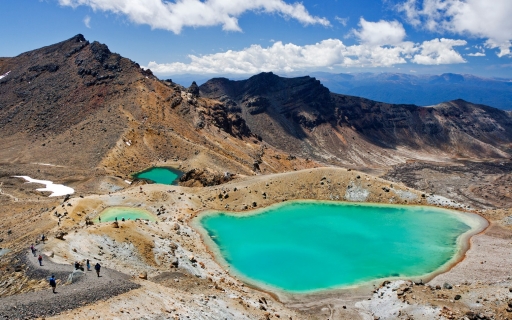Rotorua Weather and Climate: A Comprehensive Guide
The weather in Rotorua sees moderate temperature fluctuations over the course of a year.
Temperatures can be warm at the high end
to roughly mild at the low end.
It also has a relatively rainy climate with high levels of precipitation.
Now, let’s explore all the climate details to give you a full picture.
Average maximum day and minimum night temperature
The weather in Rotorua changes moderately throughout the year, offering enough variation to appreciate each season. On average, daytime temperatures range from a comfortable 24°C in February to a moderate 13°C in July.
Nighttime temperatures can drop, with average lows reaching 5°C in July. Check out our detailed temperature page for more information.Temperature ranges by month
Precipitation and rainy days
Rotorua experiences significant rainfall throughout the year, averaging 1389 mm of precipitation annually. The wettest period in Rotorua occurs in September, which receives around 132 mm of precipitation. During the driest month, January, Rotorua experiences moderate rainfall, totaling approximately 95 mm. The consistent precipitation levels throughout the year contribute to a relatively stable climate.The mean monthly precipitation over the year, including rain, hail and snow
Sunshine over the year
In Rotorua, summer days are longer and more sunny, with daily sunshine hours peaking at 8.0 hours in January. As the darker season arrives, the brightness of the sun becomes less. June sees a soft sun for only 4.0 hours per average day. Visit our detailed sunshine hours page for more information.Monthly hours of sunshine
Daily hours of sunshine
Average humidity
The city experiences its highest humidity in May, reaching 87%. In January, the humidity drops to its lowest level at 77%. What does this mean? Read our detailed page on humidity levels for further details.
Relative humidity over the year
broken clouds and no rain clear and no rain clear and no rainForecast for Rotorua
Select a Month of Interest
Check the conditions for any month of the year.
The best time of year to visit Rotorua in New Zealand
During the months of January, February, March and December you are most likely to experience good weather with pleasant average temperatures that fall between 20°C and 26°C.Other facts from our historical weather data:
February has an average maximum temperature of 24°C and is the warmest month of the year.
The coldest month is July with an average maximum temperature of 13°C.
September tops the wettest month list with 132 mm of rainfall.
January is the driest month with 95 mm of precipitation.
January is the sunniest month with an average of 240 hours of sunshine.
No idea where to travel to this year? We have a tool that recommends destinations based on your ideal conditions. Find out where to go with our weather planner.




